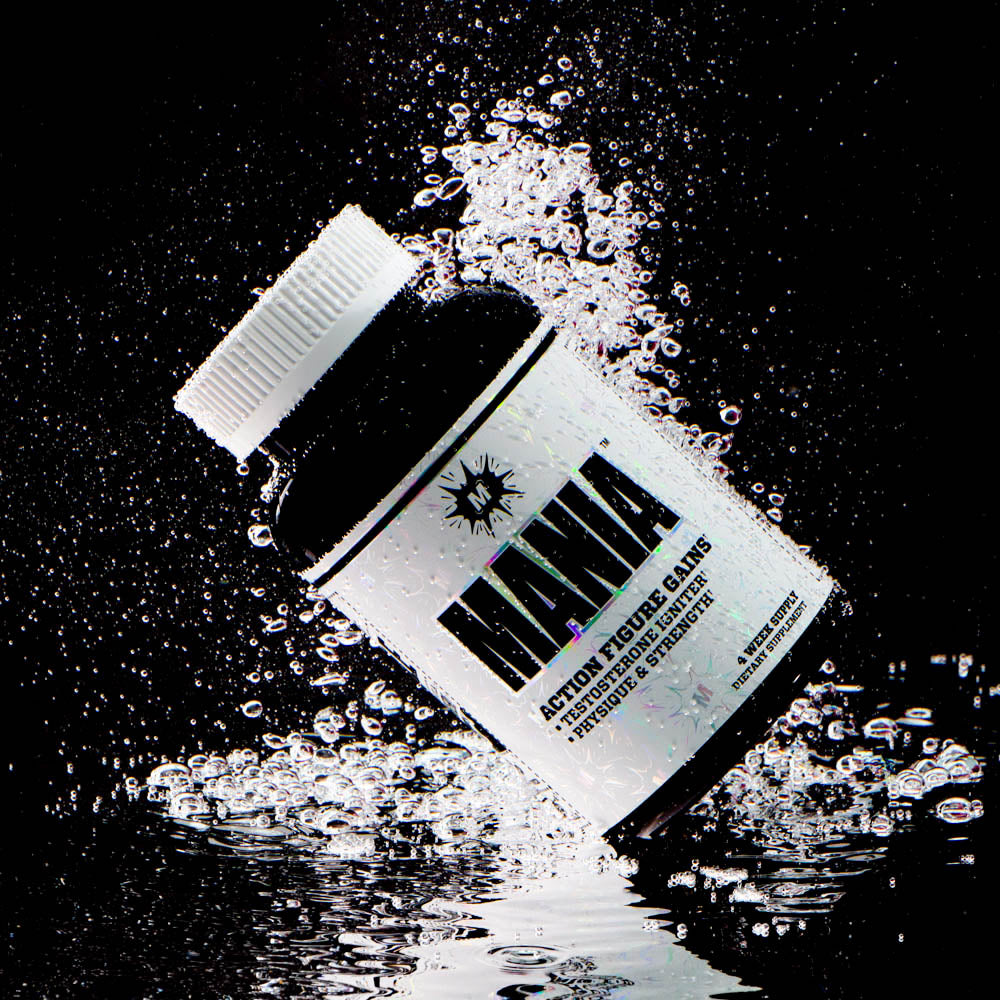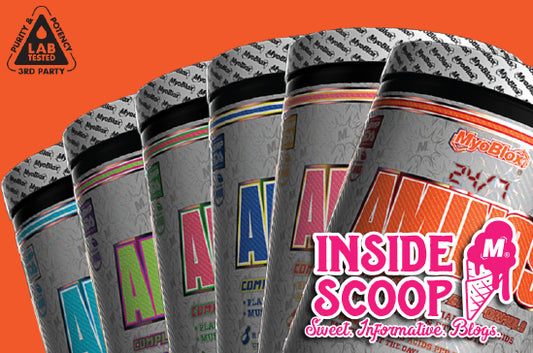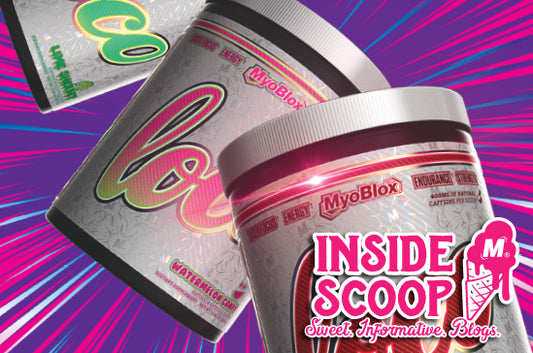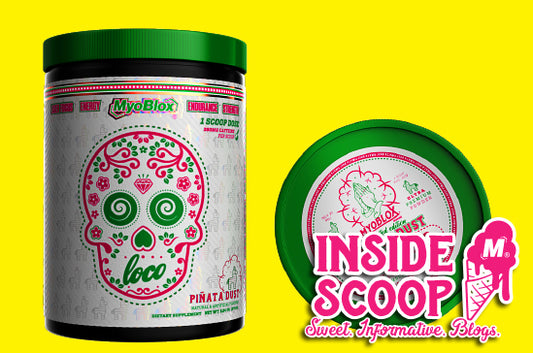
MANIA: BEHIND THE LABEL
Mania is a unique testosterone-boosting product that contains ingredients not commonly associated with your typical test-booster. Mania combines adaptogens with Ayurvedic herbs to help combat stress and fatigue-induced cortisol release, which can lower testosterone levels. It also supplies a hefty dose f fulvic acid, which has been shown to naturally increase testosterone production. This article will explain in detail the main ingredients, how they work in the body, and the science behind their ability to raise your body's testosterone production.
Rhodiola rosea: Rhodiola rosea is part of a class of compounds known as adaptogens. Adaptogens are natural herbs that can help the body adapt to physiological or environmental stress and regain homeostasis. To be an adaptogen, a compound must be 1) natural and safe with no side effects 2) non-specific action to improve resistance to stress and 3) must exert a balancing/normalizing action on the body. Specifically, rhodiola is well known for reducing fatigue, both mental and physical and can enhance cognitive function. The main active molecules in rhodiola are p-tyrosol (and its glucoside salidroside) and rosavins. Rhodiola works by affecting the levels and activity of catecholamines like dopamine, serotonin, and adrenaline, which are released when your body is trying to deal with stress. Rhodiola can acts as a monoamine oxidase (MAO) inhibitor, which prevents the breakdown of the aforementioned catecholamines, as well as preventing the depletion of catecholamines from your adrenal glands. It may also work by suppressing stress-induced release of cortisol.1 Rhodiola has also been shown in several studies to aid in exercise performance, including increasing time-to-exhaustion and perceived fatigue, possibly due to its effect on stress.2,3 Rhodiola may also have a testosterone-boosting effect. A patent was filed that showed a rhodiola extract(containing 2% Salidrosides) taken at 2g a day for 30 days was able to raise testosterone levels by 76% compared to just 6% for the placebo.4 In a different study involving 70 young healthy males, subjects that were taking a rhodiola/gingko biloba supplement had a higher testosterone to cortisol ratio than the placebo, which is an indicator of fatigue and overtraining.5 There is an established link between elevated cortisol levels and lowered testosterone levels. Rhodiola may help prevent testosterone from lowering during high–intensity exercise or high-stress situations. Typical doses of rhodiola rosea(3% rosavins and 1% salindroside) are 200-2000mg/d either in split doses or all at once.
Tongkat ali 100:1 extract: Tongkat Ali has been used for thousands of years in Ayurvedic medicine as an aphrodisiac, to enhance libido and to treat erectile dysfunction. Tongkat ali, from the plant eurycoma longifolia(sometimes called longjack) contains quassinoid compounds like eurycomanone and eurycomanol,as well as eurypeptides which are considered the main bioactive compound with regards to sexual function. Tongkat ali's mechanism to increase testosterone has not been fully elucidated, but it's believed to stem from the eurypeptides. It is hypothesized that these eurypeptides can increase the activity of 17alpha-hydroxlase, an enzyme in the testes that increases the conversion of pregnenlone to DHEA, which then converts into androgens like testosterone and androstenediol. One study in rats helps to support this theory by observing an increase in the size of the muscle levator ani, which is indicative of androgen-induced muscle growth.6 There have only been a few human studies with tongkat ali relating to increasing testosterone levels, most have been in rats. The first one involved 320 healthy males with age-related low testosterone. Subjects who received 200mg/d of tongkat ali for 30 days experienced a 46% increase in free testosterone, which is the active form. They also reported increases in libido and erections.7 A 2013 study looked at both men and women and the effect of tongkat ali on testosterone levels. Over 4 weeks, 64 men and women either took 200mg/d of tongkat ali or a placebo. The tongkat ali group notcied a 37% increase in total testosterone levels, as well as a 16% reduction in cortisol.8 Although only a pilot study with 12 participants(both men and women over 55), this yielded the greatest results with regards to increases in testosterone. Men taking 400mg/d of tongkat ali experienced a 15% increase in total testosterone, along with a 61% increase in free testosterone. Women taking the same dose had even better results, yielding a 41% increase in total testosterone and 122% increase in free testosterone. These are major results for women, and no side effects were reported.9 Typical doses of tongkat ali are between 100-400mg/d.
Spilanthese acmella(spilanthol 3.5%): Spilanthese acmella, commonly referred to as the "toothache plant" due to its use as a topical oral pain reliever. Spilanthese contains molecules called N-alkylamides, with spilanthol being the main bioacitve.10 In research in rats, spilanthese has shown an increase in testosterone levels up to 115%. Researchers hypothesize that the increase in testosterone was due to an increase in both LH and FSH, up to 48% and 120%, respectively.11 Unfortunately, research is very limited and there is only one human study using spilanthese in conjunction with orchis latifolia. Of the 13 subjects who received the two supplements, 8 were considered by the authors to be "responders." This means that they had a positive effect from the supplement. These "responders" achieved a 56% increase in testosterone after 15 days vs the placebo group who saw a 4% increase. If you average the data for the entire 13 subjects, there was a 29% increase in testosterone.12 One last interesting property of spilanthese is its abilty to act as a pro-erectile, similar to Viagra. In one study in rats, spilanthese at 150mg/kg for 28 days produced a 298% increase on the penile erection index, where Viagra(5mg/kg) produced a 202% increase. The spilanthese group noticed the pro-erectile properties lasted 14 days after cessation, which implies a build-up effect.11 More research is needed, but it looks very promising as a testosterone-boosting agent. Typical doses of spilanthese acmella are between 1600-2200mg/d.
FULVIPURE™ (83% Fulvic acid): Fulvic acid is one of the main bioactive compounds from the adaptogen shilajit which has been used in Ayurveda medicine for vitality and fertilization. Shilajit translates to “conqueror of mountains and destroyer of weakness" in Sanskrit. Most shilajit contains 2-6% fulvic acid by mass.13 Because of its' extreme lipophilicity, fulvic acid is great for chelation and mineral transportation not only across cell membranes, but also removing harmful heavy metals from the body. It can effectively carry 60 times its weight in minerals, and why it has been used in soil to help with plant germination and detoxification.14 One of the other main benefits from supplementing with fulvic acid is its ability to increase testosterone levels. Probably the best study demonstrating this involves 75 healthy men(mean age 50) who either received a 250mg 2x a day of a branded shilajit supplement containing 50% fulvic acid or a placebo for 90 days. Subjects taking the shilajat saw a 20% increase in total testosterone levels, as well as a 19% increase in free testosterone, which is the active form. Researchers concluded that the mechanism of action for raising testosterone levels was an increase in FSH levels and an increase in DHEA production.15 The only other human study involved 60 infertile men who either took 100mg(54.8% fulvic acid) of shilajit or a placebo twice a day for 90 days. Participants who used the shilajit supplement noticed a 23.5% increase in total testosterone, a 9.4% increase in FSH, as well as a 61% increase in total sperm count and a 17% increase in sperm motility. Free testosterone levels were not tested.16 Another benefit of fulvic acid is its positive affect on blood lipids. In a study using 2g/d of shilajit (6.6% fulvic acid), subjects notcied a 22% decrease in triglycerides, a 6% increase in HDL(good cholesterol), and a 23% decrease in LDL(bad cholesterol).17 Overall, fulvic acid has many health benefits, including increasing testosterone levels in men(unknown if will affect women the same way). Typical daily doses of shilajit are between 200-2000mg, depending on the standardization of fulvic acid. 100-400mg of fulvic acid a day seems to enough to reap all the benefits.
References:
- Hung, Shao Kang, Rachel Perry, and Edzard Ernst. "The effectiveness and efficacy of Rhodiola rosea L.: a systematic review of randomized clinical trials." Phytomedicine4 (2011): 235-244.
- De Bock, Katrien, et al. "Acute Rhodiola rosea intake can improve endurance exercise performance." International journal of sport nutrition and exercise metabolism3 (2004): 298-307.
- Spasov, A. A., et al. "A double-blind, placebo-controlled pilot study of the stimulating and adaptogenic effect of Rhodiola rosea SHR-5 extract on the fatigue of students caused by stress during an examination period with a repeated low-dose regimen." Phytomedicine2 (2000): 85-89.
- Xiu, R. (2000). Rhodiola and use thereof. 6,399,116. Patent
- Zhang, Zhang-jin, et al. "Dietary supplement with a combination of Rhodiola crenulata and Ginkgo biloba enhances the endurance performance in healthy volunteers." Chinese journal of integrative medicine3 (2009): 177-183.
- Ang, Hooi Hoon, and Hung Seong Cheang. "Effects ofEurycoma longifolia Jack on laevator ani muscle in both uncastrated and Testosterone-Stimulated castrated intact male rats." Archives of pharmacal research5 (2001): 437-440.
- Tambi, M. I. B. M., M. K. Imran, and R. R. Henkel. "Standardised water‐soluble extract of Eurycoma longifolia, Tongkat ali, as testosterone booster for managing men with late‐onset hypogonadism?." Andrologias1 (2012): 226-230.
- Talbott, Shawn M., et al. "Effect of Tongkat Ali on stress hormones and psychological mood state in moderately stressed subjects." Journal of the International Society of Sports Nutrition1 (2013): 28.
- Henkel, Ralf R., et al. "Tongkat Ali as a potential herbal supplement for physically active male and female seniors—a pilot study." Phytotherapy Research4 (2014): 544-550.
- Boonen J; “LC-MS profiling of N-alkylamides in Spilanthes acmella extract and the transmucosal behaviour of its main bio-active spilanthol”; J Pharm Biomed Anal; 2010 Nov 2; 53(3):243-9;
- Sharma, Vikas, et al. "Spilanthes acmella ethanolic flower extract: LC–MS alkylamide profiling and its effects on sexual behavior in male rats." Phytomedicine13 (2011): 1161-1169.
- Moran, Ryan G., Alex T. VonSchulze, and Richard J. Bloomer. "Impact of an Herbal Dietary Supplement Containing Spilanthes acmella and Orchis latifolia on Testosterone in Young Men." Journal of Biology and Life Science1 (2016): 28-41.
- Gandy, Justin J., Jacques R. Snyman, and Constance Ej Van Rensburg. "Randomized, parallel-group, double-blind, controlled study to evaluate the efficacy and safety of carbohydrate-derived fulvic acid in topical treatment of eczema." Clinical, cosmetic and investigational dermatology 4 (2011): 145.
- Islam, K. M. S., A. Schuhmacher, and J. M. Gropp. "Humic acid substances in animal agriculture." Pakistan Journal of nutrition3 (2005): 126-134.
- Pandit, S., et al. "Clinical evaluation of purified Shilajit on testosterone levels in healthy volunteers." Andrologia5 (2016): 570-575.
- Biswas, Tuhin Kanti, et al. "Clinical evaluation of spermatogenic activity of processed Shilajit in oligospermia." Andrologia1 (2010): 48-56.
- Sharma, Praveen, et al. "Shilajit: evalution of its effects on blood chemistry of normal human subjects." Ancient science of life2 (2003): 114.









1 comment
On this product for 2 weeks and working really hard in the gym. I have much harder muscles and have gained 1/2 inch in my bicep this far. In hope it keeps going that way. Great product. Love it.